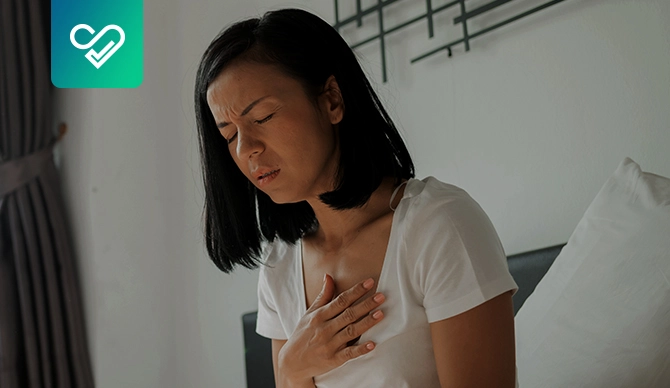Table of contents
What Are Heart Palpitations?
Nighttime heart palpitations can be explained as the sensations caused by irregular heartbeat at night, when you experience abnormal heart rhythms, with your heart either beating too fast, or too hard.
It can feel like your heart is skipping beats, fluttering, or pounding in your chest. While heart palpitations at night can be alarming, they are often harmless and temporary. However, in some cases, they may signal an underlying heart condition that requires medical attention.
Causes of Heart Palpitations At Night
Several factors can trigger abnormal heart rhythms- heart palpitation causes include:
- Stress and Anxiety: Emotional stress and anxiety can trigger the release of stress hormones, leading to heart racing at night.
- Caffeine and Stimulants: Consumption of caffeine, nicotine, or other stimulants close to bedtime can stimulate the heart and cause abnormal heart rhythms.
- Medications: Certain medications, such as decongestants, asthma inhalers, and some antidepressants, may also cause frequent heart palpitations as a side effect.
- Hormonal Changes: Fluctuations in hormone levels, particularly during menstruation, pregnancy, or menopause, can affect heart rhythm and trigger heart palpitations at night.
- Sleep Disorders: Conditions like sleep apnea, characterized by interrupted breathing during sleep, can lead to oxygen deprivation and irregular heartbeats.
- Underlying Heart Conditions: Arrhythmias, heart valve disorders, coronary artery disease, and other structural heart problems can predispose individuals to nocturnal palpitations.
- Digestive Issues: Gastroesophageal reflux disease (GERD) or acid reflux can cause discomfort in the chest, which may be mistaken for palpitations.
- Excessive Physical Activity: Intense exercise or physical exertion close to bedtime can stimulate the heart and lead to heart palpitations at night while trying to fall asleep.
Symptoms of Heart Palpitations At Night
In addition to the palpitations themselves, heart palpitations at night may also be accompanied by symptoms such as:
- Rapid Heartbeat: Sensation of the heart racing at night or beating faster than usual.
- Fluttering or Skipping Beats: Feeling of heart fluttering or skipping beats irregularly.
- Pounding Sensation: Perception of a strong, forceful heartbeat in the chest.
- Chest Discomfort: Some individuals may experience discomfort or mild chest pain.
- Shortness of Breath: Difficulty breathing or feeling breathless, especially during palpitations.
- Dizziness or Lightheadedness: Feeling faint or dizzy, possibly accompanied by waking up with racing heart.
- Fatigue: Experiencing tiredness or exhaustion during the day due to disrupted sleep from nocturnal palpitations.
How Are Heart Palpitations Diagnosed?
Diagnosing the underlying cause of heart palpitations often involves a combination of medical history review, physical examination, and diagnostic tests.
These tests may include electrocardiogram (ECG), echocardiogram, Holter monitor, stress test, and blood tests to evaluate thyroid function and electrolyte levels.
How To Treat Heart Palpitations At Night?
Treatment for heart palpitations at night depends on the underlying cause. The treatment options may include:
- Lifestyle Modifications: Adopting healthy habits such as reducing stress, avoiding caffeine and nicotine close to bedtime, maintaining a regular sleep schedule, and staying hydrated can help minimize heart palpitations at night.
- Stress Management: Techniques such as deep breathing exercises, meditation, yoga, or counseling can help reduce stress and anxiety, which may contribute to nighttime heart palpitations.
- Medication Adjustment: If medications are identified as a trigger for palpitations, your doctor may adjust the dosage or switch to alternative medications that are less likely to cause abnormal heart rhythms.
- Treating Underlying Conditions: Addressing underlying medical conditions such as sleep disorders (e.g., sleep apnea), overactive thyroid, or gastroesophageal reflux disease (GERD) can alleviate nighttime heart palpitations.
- Avoiding Triggers: Identifying and avoiding triggers such as heavy meals, vigorous exercise, or alcohol intake close to bedtime can help prevent frequent heart palpitations.
- Beta-Blockers: Medications such as beta-blockers may be prescribed to regulate heart rate and reduce the frequency and intensity of palpitations, particularly for individuals with arrhythmias.
- Anti-Anxiety Medications: In cases where anxiety or panic disorder contributes to nocturnal palpitations, medications such as benzodiazepines or selective serotonin reuptake inhibitors (SSRIs) may be prescribed to get rid of the symptoms.
- Cardiac Procedures: For individuals with severe or frequent heart palpitations due to underlying heart conditions, cardiac procedures such as catheter ablation or implantation of a pacemaker may be recommended to restore normal heart rhythm.
– Disclaimer –
This blog is for informational & educational purposes only and does not intend to substitute any professional medical advice or consultation. For any health-related concerns, please consult with your physician, or call 911.

